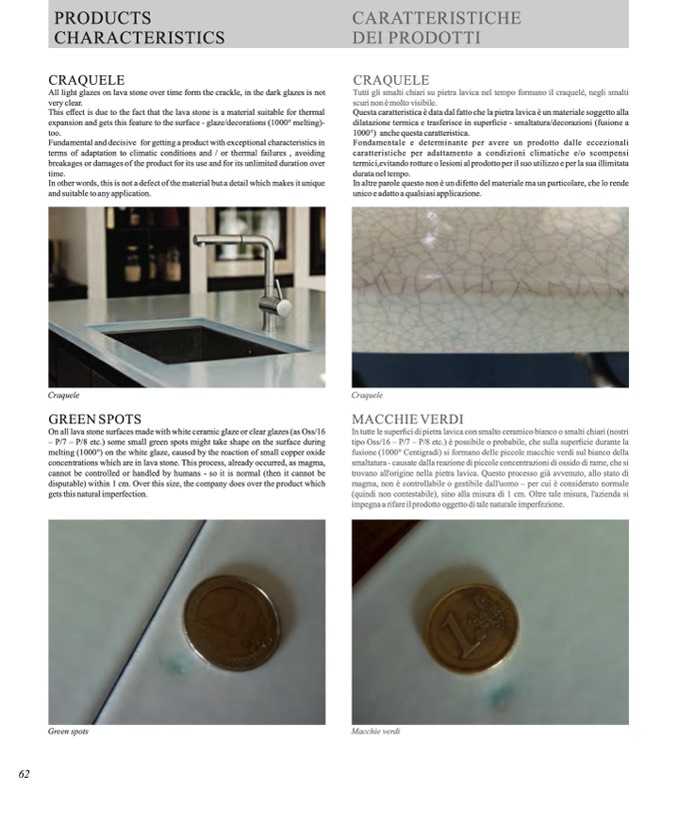
CRAQUELE
All light glazes on lava stone over time form the crackle, in the dark glazes is not
very clear.
This effect is due to the fact that the lava stone is a material suitable for thermal
expansion and gets this feature to the surface - glaze/decorations (1000° melting)-
too.
Fundamental and decisive for getting a product with exceptional characteristics in
terms of adaptation to climatic conditions and / or thermal failures , avoiding
breakages or damages of the product for its use and for its unlimited duration over
time.
In other words, this is not a defect of the material but a detail which makes it unique
and suitable to any application.
CRAQUELE
Tutti gli smalti chiari su pietra lavica nel tempo formano il craquelé, negli smalti
scuri non è molto visibile.
Questa caratteristica è data dal fatto che la pietra lavica è un materiale soggetto alla
dilatazione termica e trasferisce in superficie - smaltatura/decorazioni (fusione a
1000°) anchequestacaratteristica.
Fondamentale e determinante per avere un prodotto dalle eccezionali
caratteristiche per adattamento a condizioni climatiche e/o scompensi
termici,evitando rotture o lesioni al prodotto per il suo utilizzo e per la sua illimitata
durata nel tempo.
In altre parole questo non è un difetto del materiale ma un particolare, che lo rende
unico e adatto a qualsiasi applicazione.
Craquele
GREEN SPOTS
On all lava stone surfaces made with white ceramic glaze or clear glazes (as Oss/16
– P/7 – P/8 etc.) some small green spots might take shape on the surface during
melting (1000°) on the white glaze, caused by the reaction of small copper oxide
concentrations which are in lava stone. This process, already occurred, as magma,
cannot be controlled or handled by humans - so it is normal (then it cannot be
disputable) within 1 cm. Over this size, the company does over the product which
gets this natural imperfection.
Craquele
MACCHIE VERDI
In tutte le superfici di pietra lavica con smalto ceramico bianco o smalti chiari (nostri
tipo Oss/16 – P/7 – P/8 etc.) è possibile o probabile, che sulla superficie durante la
fusione (1000° Centigradi) si formano delle piccole macchie verdi sul bianco della
smaltatura - causate dalla reazione di piccole concentrazioni di ossido di rame, che si
trovano all'origine nella pietra lavica. Questo processo già avvenuto, allo stato di
magma, non è controllabile o gestibile dall'uomo – per cui è considerato normale
(quindi non contestabile), sino alla misura di 1 cm. Oltre tale misura, l'azienda si
impegna a rifare il prodotto oggetto di tale naturale imperfezione.
62
Green spots
Macchie verdi
PRODUCTS
CARATTERISTICHE
CHARACTERISTICS
DEI PRODOTTI

